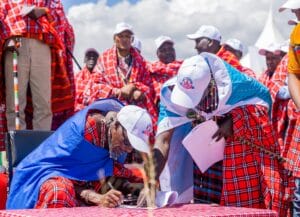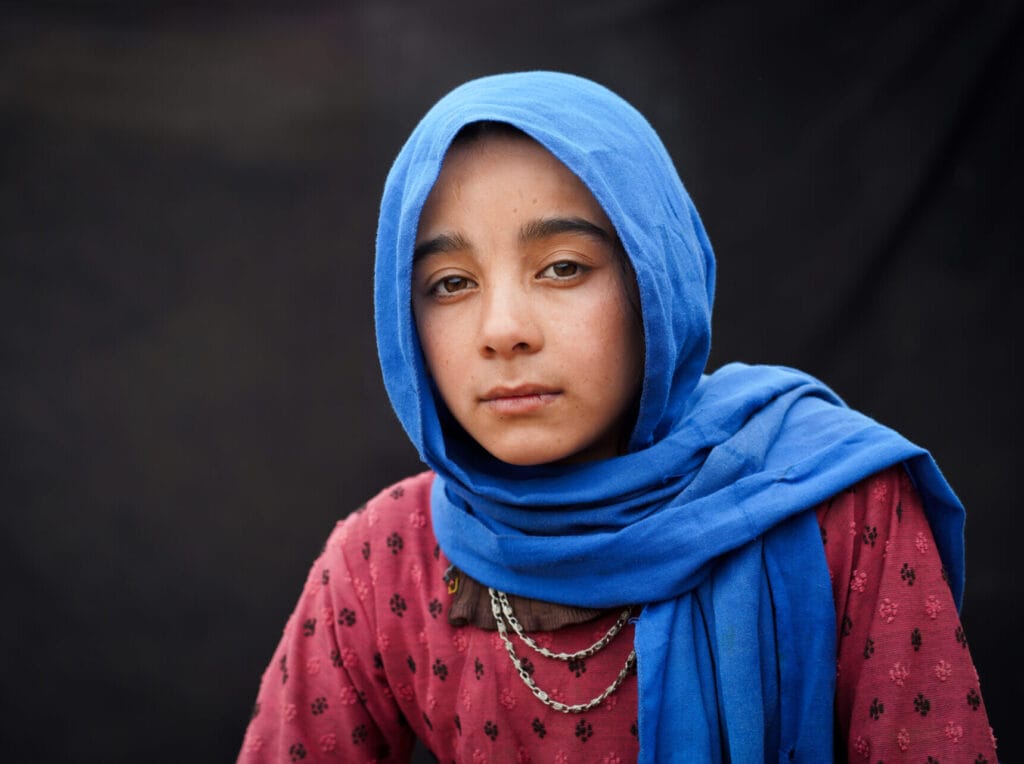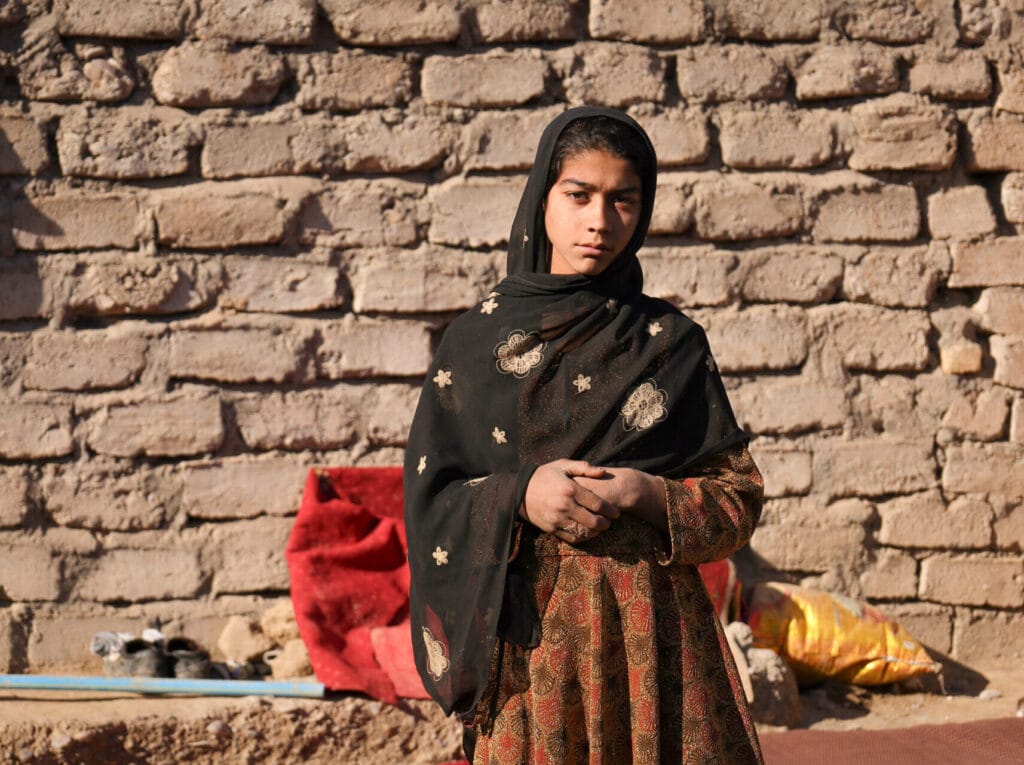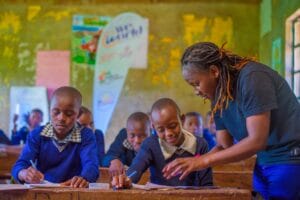
In today’s world, being a woman or a girl often means having to fight for rights that should be fundamental. Too many are still denied education, forced into early marriages, excluded from decision-making, and subjected to violence and systemic discrimination. But women and girls are not standing still: they’re stepping forward, claiming space, raising their voices, and asserting their rights. Our new Atlas captures the state of women's and girls' rights around the world.
30 years after Beijing
Thirty years after the historic Beijing Conference on women's rights, much progress has been made, but the ground gained is far from secure. Compared to the past, women today can vote, do the same jobs as men, participate in public life, and make decisions about their own bodies. Yet, these rights are under attack in many parts of the world: in several countries, funding for services to combat, protect against and prevent gender-based violence and for sexual and reproductive health and rights is being progressively scaled back. In Afghanistan, girls are barred from attending secondary schools and universities; in Iran, women risk imprisonment if they decide to empower themselves; while in the United States, the reinstatement of the Global Gag Rule has interrupted the provision of essential health services, and the overturning of Roe v. Wade has stripped millions of women of their right to safe abortion. This reality reminds us that women’s rights are never a given, but must be protected and fought for, day after day.
Our new Atlas
You’ll find these insights, and many more, in our latest Atlas, "Claiming Space. Atlas on Women's and Girls' Rights", third in our series of Atlases, following "Flowing Futures", on access to water and sanitation, and "WeCare", on sexual and reproductive justice. We chose this title to reflect how, despite ongoing assaults on their rights, women continue to rise, reclaiming space, asserting their voices, and defying those who seek to sideline them. When they do so, they generate transformative practices that profoundly impact society.
The Atlas brings together data, maps, and research to describe and measure the violations of rights of women and girls, and the challenges they face every day around the world.
Each chapter is dedicated to one of the four areas of intervention that WeWorld focuses on through its projects in Italy and globally: securing rights to strengthen agency; combating gender-based violence; promoting sexual and reproductive health; and amplifying the voices of women and girls to transform communities. Alongside the data, the Atlas presents concrete examples drawn from WeWorld’s programmes in over 20 countries, showcasing solutions and good practices.

Denied but not forgotten: women’s rights in focus
Too often, women do not have full control over their own lives. Their choices are not only limited by unfair laws and rules, but also by deep-rooted stereotypes and social expectations, which constrain their choices and prevent women and girls from realising their full potential. For this reason, in the Atlas, we place strong emphasis on gender equality, starting from the concept of agency: the ability to make decisions for oneself, to influence one's environment, and to freely build one's own future. We delve into the many forms of discrimination that women and girls face across different spheres—from employment to access to resources, from education to political participation—to highlight how much work remains to be done to ensure equal rights and opportunities.
Today, around the world:
- 1 in 10 women lives in extreme poverty (less than $2.15 per person per day).
- Women perform 2.5 times more unpaid care work than men, including a total of 250 million hours a day spent collecting water, three times more than men and boys, limiting their access to the formal labour market.
- 80% of women work in informal jobs, compared to 66% of men. Informal work lacks basic protections such as paid leave, pensions, or protection against abuse.
- Women earn 20% less than men for jobs of equal value.
- Globally, less than 15% of landowners are women.
- In situations of war or emergency, girls are 2.5 times more likely than boys to drop out of school.
- Over 119 million girls do not attend school, and 39% do not complete upper secondary education.
- Nearly 75% of legislators today are men, and 103 countries have never had a woman head of state.
- In 19 countries, women cannot choose the same jobs as men; in 18, husbands can prevent their wives from working.
Our Atlas goes beyond highlighting problems, it offers solutions as well. For years, WeWorld has championed women’s empowerment and female agency through projects that generate good practices and deliver real, lasting change. Among these, technical and vocational training courses (TVET) in Tunisia enable women to acquire skills that are useful for achieving economic independence. In Mozambique, on the other hand, we have supported the creation of women's committees for water resource management. Women are responsible for collecting and distributing water to the community and maintaining the pumps, gaining experience in roles of responsibility that are often not open to them. At the same time, the construction of new wells and the introduction of green technologies reduce water-related violence and ease women’s burden. Through these and many other initiatives, we aim to drive truly transformative gender change, improving the lives of women and the communities around them by challenging stereotypes and dismantling traditional roles.

"Although women make up more than half the population, they remain marginalized in decision-making processes. Without effective measures to ensure women's participation in institutions, public policies risk continuing to reflect an exclusively male perspective, excluding women's rights and gender equality issues. Structural commitment and strong public policies are essential to create a society in which women live free from violence and have equal economic and political opportunities." Massimo Baraglia, WeWorld Country Representative in Tanzania
“Our approach is to recognise and amplify women’s contributions wherever possible. When female engineers or technicians are present, we actively seek their collaboration and support their visibility. In less structured contexts, where we help set up local water management committees, we ensure a minimum percentage of women is included. By integrating gender perspectives and gradually building inclusive structures, we are helping to change the norms. It is not about changing everything overnight but about creating spaces where women's voices can be strengthened and their leadership can take root." Anna Crescenti, WASH Expert for WeWorld
Combating gender-based violence: a collective responsibility
Gender-based violence is a violation of human rights and an obstacle to the freedom and autonomy of women and girls. From early marriage to sexual exploitation and intimate partner violence, it is a global issue. In our Atlas, we dedicate a specific section to understanding the different forms of gender-based violence — physical, sexual, psychological, economic, verbal, institutional or cultural — because it is a structural problem, rooted in societies built on patriarchal values, and not a private matter. We also analyse how violence changes in contexts of crisis or conflict, where the weakening of social norms and institutions increases the risks for women and girls.
This approach allows us to show the profound consequences of violence: physical and psychological trauma, social exclusion, economic deprivation and concrete limitations on the ability to make decisions about one's own life. At the same time, we highlight how violence sustains systems of male and heteronormative domination, punishing those who challenge traditional roles and stereotypes.
Data shine a light on the scale of the problem—and reveal why urgent action is not just necessary, but critical:
- Globally, one woman or girl is killed every 10 minutes at the hands of a partner or close relative. A total of 85,000 women and girls were killed intentionally in 2023.
- Intimate Partner Violence is the most prevalent form of violence against women, occurring in both conflict and non-conflict settings. Despite its prevalence, IPV receives less attention in conflict zones, often being viewed as a private family issue.
- 70% of women in humanitarian settings experience gender-based violence.
Our commitment goes beyond reporting: we work every day to build concrete alternatives that restore power and freedom to women. Through targeted initiatives, WeWorld promotes women's autonomy and combats gender inequality, generating concrete and lasting change in communities.
- Through the Spazio Donna programme, which has 7 centres in 6 Italian cities, we support women in preventing, identifying and escaping gender-based violence, providing them with the tools to regain their safety and dignity.
- In Kenya, through the IMARA project, we tackle gender-based violence, female genital mutilation (FGM), early marriage, and other harmful practices, challenging norms and traditions that limit girls' opportunities and rights.
- In Tanzania, our collaboration with the Bunju Centre allows us to offer protection and education programmes to girls who are victims of exploitation, abuse or extreme poverty, creating safe spaces where they can grow and develop their potential.
- In Nicaragua, with the #UnaVezMásNO project, we have expanded access to psychosocial, health, and legal support for survivors of violence, while promoting their economic empowerment through training programmes.
“In my daily life, I had no control over anything. I had to justify every expense. He always came shopping with me and decided what I could and couldn't buy, especially when it came to groceries. I couldn't buy anything, and he kept the little bit of money I had left from my pension.” testimony collected by WeWorld Spazio Donna
“Cultural and social norms often marginalise girls, forcing them into early marriage and denying them access to education, healthcare and protection from violence. These are fundamental human rights, yet for many women here they remain unattainable. Cultural expectations and social pressures discourage women from pursuing careers or roles outside their domestic responsibilities. Displacement, extremism and protests further exacerbate these challenges, making it almost impossible for many women to break free from the cycle of exclusion.” Viviana Bianchessi, Country Representative for WeWorld in Mali
Sexual and reproductive health is a matter of justice
Across the globe, women’s and girls’ sexual, reproductive, and mental health is too often overlooked, and sometimes even actively obstructed. Issues relating to bodily autonomy are treated as controversial topics rather than fundamental rights, while mental health is stigmatised. These interconnected forms of injustice are shaped by gender norms, stereotypes and inequality. As a result, women and girls are forced to contend with barriers to essential services and restrictive policies that undermine their bodily autonomy. That is why our Atlas shows how recognising everyone's right to bodily autonomy is a fundamental step towards achieving true gender equality. Today, these rights are still far from being realised:
- Over 200 million women worldwide still lack access to contraceptives, and unsafe abortions cause approximately 39,000 preventable deaths each year.
- Today, 45% of all abortions globally are unsafe, and 97% of these It occurs in low-income countries. Unsafe abortion is a leading cause of maternal mortality, contributing to between 4.7% and 13.2% of maternal deaths each year.
- At least 500 million people worldwide lack access to basic menstrual management products and necessary sanitation facilities.
- A survey conducted by WeWorld and Ipsos in Italy found that talking about menopause in the workplace is still taboo: 1 in 3 people consider it unprofessional and 1 in 4 men believe that women going through the menopause are not suited to leadership roles.
In addition to highlighting critical issues and gaps in sexual and reproductive health, WeWorld is also actively engaged in building solutions that empower people and guarantee access to rights.
- In Burundi, we support women in accessing prenatal services and making informed decisions about their health and the well-being of their children, promoting knowledge and empowerment.
- In Mozambique, Casa Mãe Espera provides safe, specialised spaces for the care of pregnant women, supporting them throughout their journey to motherhood.
- In Syria, we work with schools to make education more inclusive: the renovation of buildings has included accessible, gender-segregated toilets to ensure privacy and safety for girls, as well as training for teachers to integrate elements of sexual and reproductive health and menstrual hygiene management into the curriculum, with a particular focus on the needs of students with disabilities.
- In Kenya, we promote peer education programmes, in which girls and boys discuss health, emotions and relationships, strengthening their knowledge, awareness and ability to make informed choices.
- In Italy, we launched our six-step Manifesto for Menstrual Justice and developed a menstrual diary designed for girls, which has been translated into many languages and adopted in Tanzania, Kenya, Lebanon, Moldova, and Ukraine.
- We also distribute menstrual health kits in conflict zones, such as Palestine, to ensure that girls and women have the practical tools they need to live their daily lives with dignity and autonomy.
"Although the humanitarian sector is committed to integrating gender considerations into its interventions, it remains difficult to fully respond to specific needs, from healthcare to protection, while rushing to provide life-saving assistance. For example, the specific health and hygiene needs related to menstruation are often neglected in war zones. This has been particularly evident in Gaza, where hundreds of thousands of women and girls have been left without adequate support." Giovanna Fotia, Country Representative for WeWorld in Palestine
We will not be silent: women's voices challenge the system
Very often, the lives of women and girls are marked by silence. Amplifying their voices is essential to transforming cultures, practices and policies because it means recognising and valuing real experiences, knowledge, and needs that have too often been stifled. When women actively participate in decision-making processes, space is created for more inclusive policies, fairer practices and narratives that challenge stereotypes and patriarchal norms.
But listening is not enough; women and girls must also be empowered to lead. Because there can be no change without the participation of women. This is why, in the Atlas, we explore how women are trying to change the rules of the game: taking active roles in their communities, challenging imposed norms, and turning personal stories into collective movements. To truly understand the change captured in this Atlas, it’s essential to recognise that our work stands on the shoulders of a long and powerful history of feminist struggles. We start from the stories and achievements of the women who came before us and draw inspiration from a global sisterhood that unites different experiences and practices.

The legacy of feminisms
Feminism, or rather feminisms, have taken many forms: from suffrage and legal rights to struggles for work, motherhood, diversity and intersectionality; from activism against patriarchy in African, Asian, Latin American and indigenous contexts, to criticism of capitalism and extractivism, to today's digital challenge and the defence of LGBTQIA+ rights.
Feminist activism takes many forms—sometimes loud and collective, other times quiet and woven into everyday life—but wherever it exists, it strengthens autonomy and participation. The women we work with draw strength from this shared legacy, while actively contributing to rewriting the rules, reshaping practices, and reframing narratives within their communities. The Atlas tells precisely this story: how women are changing the world around them, step by step.
Claiming Space is more than just the title of the Atlas: it is the common thread that runs through every story, every voice, and every act of change we’ve built together. Each project, initiative, and practice featured here shows how women are speaking out, occupying space, and transforming the communities they live in. We work to support this process every day, with awareness-raising, advocacy, and community mobilisation projects that put women and girls at the centre, so that their actions can have a profound impact on norms, policies, and community life.
- For example, every year we participate in the ‘16 Days of Activism’ campaign (25 November - 10 December), organising meetings and events, especially in South-East Africa, to amplify women's voices and stimulate social change.
- With the Wonder Women documentary series, we have told the stories of women facing the climate crisis, challenging traditional narratives and showcasing the power of their words and actions.
- As part of the Kujenga Amani Pamoja project, the “Women See Many Things” photovoice initiative has enabled women on the Swahili coast to acquire technical skills and awareness of the communicative power of photography, transforming personal experiences into collective narratives.
- In Italy, our Spazi Donna centres play a fundamental role not only in the emancipation of women, but also in actively involving men and boys as active participants in the pursuit of gender equality, implementing targeted training and educational activities in both schools and workplaces. In addition, we organise public initiatives designed to inform and directly engage people, creating spaces for dialogue, connection and shared responsibility, such as “Chiacchierata Femminista” (Feminist Chat), a series of informal meetings where women come together to reflect on what it means to be a woman today, exploring topics such as gender roles, relationships and personal freedom. WeWorld also participates in marathons, such as the Milan Marathon and StraWoman, to raise awareness and support our Women's Spaces.
- To promote menstrual justice in Italy and around the world, together with CHEAP, an important public art collective, we launched the ‘#LegalizeMestruazioni’ campaign to break taboos and start a public debate on menstrual rights.
All these examples show that it is necessary to create spaces where they can lead, influence and rewrite rules and narratives. Claiming Space means just that: recognising the skills, stories and aspirations of women and girls and supporting them in transforming silence and exclusion into active participation and real change.
"The rebellion of bodies, among the girls of Dar es Salaam, and likely throughout Tanzania and many other places around the world, is a silent and timid revolt. In our imagination, revolutions must make noise, tear down walls, mark a before and after. But sometimes this isn't possible because the silence is so oppressive that only a whisper can break it." Claudia Bellante, founder of RACCONTAMI
"We offer training in schools and workplaces, starting with culture and gender equality, where resistance often first arises. People do not always recognise stereotypes because we all think in categories; exposing them is essential. It is not about blame, but about awareness, because without it, stereotypes can become dangerous. In schools, we explore sex and emotional education, stimulating deep reflection." Francesca Martino, Coordinator of Spazio Donna Milano Giambellino
Our commitment to women's and girls' rights continues
Thirty years after the Beijing Conference, women have raised their voices, occupied spaces, and increased their opportunities to make decisions for themselves and have an impact on their communities. Yet no country has achieved true gender equality, and the inequalities that persist are deep and interconnected.
Changing them requires ongoing, committed work—work that addresses the root causes and challenges the systems that sustain inequality. Our gender-transformative approach means just that: not simply “adding a gender perspective”, but integrating it into every action and project, in every community and in every context. It means working on cultural norms, power relations and everyday practices to ensure that change is lasting and structural. It means creating spaces where women and girls can participate, guide decisions, exercise their rights and have an impact in their communities, while at the same time changing the narratives and expectations that govern gender roles.
Claiming Space, therefore, is not just a slogan: it is women and girls speaking out, occupying spaces and rewriting the rules, generating concrete changes in their lives and communities. The Atlas tells these stories, and we are there, every day, to support this profound and collective cultural process, so that change is not only visible but lasting.



